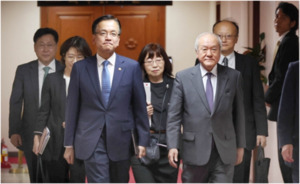

The resurgence of the “strong dollar” is shaking the global foreign exchange market, with the Chinese yuan, Japanese yen, and South Korean won all facing significant depreciation.
According to the Bank for International Settlements (BIS), the real effective exchange rate of the South Korean won fell by 1.4% from January to May this year, marking the fifth-largest drop among the 38 OECD countries. During the same period, the Japanese yen plummeted by 5.4%, hitting a record low of 68.65 in May.
Under the circumstances, South Korea’s Deputy Prime Minister and Minister of Economy and Finance, Choo Kyung-ho, and Japanese Finance Minister Shunichi Suzuki convened the 9th South Korea-Japan Finance Ministers’ Meeting to address these pressing economic issues at the Government Complex Seoul, on June 25.
The meeting, held for the first time in a year, saw both finance ministers expressing deep concerns over the rapid depreciation of their currencies. The South Korean won is nearing the 1,400 won per dollar mark, while the Japanese yen is on the verge of hitting a record low of 160 yen.
In a joint statement, the finance ministers noted, “The global and regional economies are recovering rapidly,” but also highlighted, “There are uncertainties such as ongoing geopolitical conflicts, the potential slowdown of major trading partners’ growth, and increased volatility in the foreign exchange market.” The core of the meeting was to strengthen joint responses to ensure foreign exchange and financial stability. “We share serious concerns about the rapid depreciation of our currencies and reaffirmed our commitment to continue taking appropriate measures,” the ministers emphasized.
One of the key topics discussed was the possibility of strengthening the South Korea-Japan currency swap, which was restored to a scale of $10 billion last year. “;We recognize the importance of the currency swap resumed last year and agree on the importance of discussing future improvements if necessary,” the ministers stated. This currency swap agreement is crucial for stabilizing foreign exchange markets and providing liquidity support during times of financial stress.
Japan also expressed its willingness to support South Korea, which is set to join the “Advanced Economies’ Government Bond Club” in September. “We share the recognition of the need to promote investment between the two countries,” Japan emphasized, highlighting the importance of bilateral economic cooperation.
